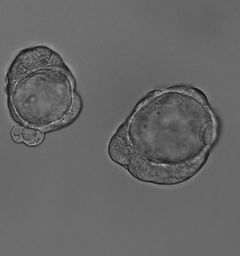
We have initiated a relatively newer program on ovarian cancer progression, wherein cells disseminate peritoneally as multicellular collectives known as spheroids. Spheroids, which are correlated with metastasis and morbidity, exhibit startling features of multicellular organization, seen otherwise in untransformed glandular tissues. We observe that a basement membrane-like ECM on the surface of spheroids is responsible for such organization, regulates spheroidal shape and size and influences their adhesion to peritoneal substrata (Langthasa et al, Life Sci Alliance, 2021).
In order to understand the process of organotropism: tissue-specific colonization by cancer cells, we have probed the contribution of O-linked DS (secreted by peritoneal mesothelia) to Coll I fibrillogenesis. We show a novel biphasic effect of DS on Coll I pattern and elastic modulus, with consequences on adhesiveness of such substrata for suspended ovarian cancer cells (Jha, Sarkar et al, Proc SPIE Photonics, 2019; Jyothsna, Sarkar et al J Biomed Mat Res A, 2021).
A collaborative study with Prof Rajan Dighe (IISc) also showed using antibody-based approaches, the spheroid-specific activation of FSH- and Notch- signaling that was relevant for their morphogenesis and proliferation (Gera et al, J Endocr Soc 2019).
